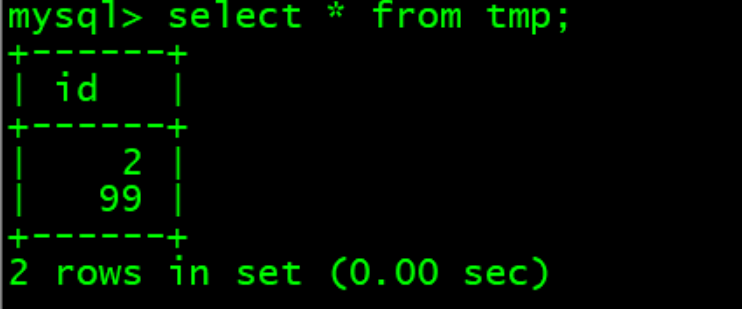Replication, replication is a highly available foundation, and the underlying layers of middleware such as MHA, mycat all rely on replication principles
Master master master instance slave Slave slave
Classification: default asynchronous replication, semi-synchronous replication after version 5.5, new GTID replication at version 5.6, multi-source replication at version 5.7, parallel replication based on group submission, and enhanced semi-synchronous replication
Replication methods: 1. Traditional methods: binlog-based replication 2.GTID: transaction-based replication
Bilogs can be in different formats: statement-based, row-based, mixed (row data replication is the default)
Set up the regular asynchronous replication below
Requirements: server_id is different between master and slave; the master library opens binlog, and it is recommended that the slave library also opens convenient schema extensions
First edit my.cnf to open binlog and set server_id
mysql> show variables like '%log_bin%'; +---------------------------------+---------------------------------------+ | Variable_name | Value | +---------------------------------+---------------------------------------+ | log_bin | ON | | log_bin_basename | /usr/local/mysql/data/mysql-bin | | log_bin_index | /usr/local/mysql/data/mysql-bin.index | | log_bin_trust_function_creators | OFF | | log_bin_use_v1_row_events | OFF | | sql_log_bin | ON | +---------------------------------+---------------------------------------+ 6 rows in set (0.00 sec) mysql> ^DBye [root@localhost ~]$ cat /etc/my.cnf [mysqld] datadir=/usr/local/mysql/data log_bin=mysql-bin server_id=1 [root@localhost ~]$
Then create a master-slave replicated user, which was used when the previous experiment created a scott user (since the password is stored in master.info in slave, you should actually create a separate user with only replication privileges)
mysql> grant replication slave on *.* to 'scott'@'%'; Query OK, 0 rows affected (0.00 sec)
Table Lock Stop Modification
mysql> flush tables with read lock; Query OK, 0 rows affected (0.01 sec) mysql> show master status; +------------------+----------+--------------+------------------+-------------------+ | File | Position | Binlog_Do_DB | Binlog_Ignore_DB | Executed_Gtid_Set | +------------------+----------+--------------+------------------+-------------------+ | mysql-bin.000003 | 556 | | | | +------------------+----------+--------------+------------------+-------------------+ 1 row in set (0.00 sec) mysql> drop table tmp; ERROR 122
Then pass a full backup of the primary library to the standby, either directly packaged in the data directory (not recommended by innodb) or directly mysqldump
[root@localhost ~]$ mysqldump --all-databases -uroot -pmysql --master-data > dbdump.db mysqldump: [Warning] Using a password on the command line interface can be insecure. [root@localhost ~]$ ls dbdump.db [root@localhost ~]$ scp dbdump.db 192.0.1.11:~ The authenticity of host '192.0.1.11 (192.0.1.11)' can't be established. ECDSA key fingerprint is SHA256:pmk8Q9EnT+TugRZ5rb2bc0GP20ZV3LkeuXP/Jrw5tbs. ECDSA key fingerprint is MD5:13:d1:4a:14:3a:4d:fd:33:56:15:f9:1f:2f:44:87:2c. Are you sure you want to continue connecting (yes/no)? yes Warning: Permanently added '192.0.1.11' (ECDSA) to the list of known hosts. root@192.0.1.11's password: dbdump.db 100% 775KB 47.6MB/s 00:00
Then apply it in the backup
mysql> source dbdump.db
Configuring primary library information from libraries
mysql> change master to
-> master_host='192.0.1.10',
-> master_user='scott',
-> master_password='tiger',
-> master_port=3306,
-> master_log_file='mysql-bin.000003',
-> master_log_pos=556;
Query OK, 0 rows affected, 2 warnings (0.01 sec)
mysql>
Turn on synchronization
mysql> start slave ;
Query OK, 0 rows affected (0.01 sec)
mysql> show slave status\G;
*************************** 1. row ***************************
Slave_IO_State: Waiting for master to send event
Master_Host: 192.0.1.10
Master_User: scott
Master_Port: 3306
Connect_Retry: 60
Master_Log_File: mysql-bin.000003
Read_Master_Log_Pos: 556
Relay_Log_File: localhost-relay-bin.000002
Relay_Log_Pos: 320
Relay_Master_Log_File: mysql-bin.000003
Slave_IO_Running: Yes
Slave_SQL_Running: Yes
Replicate_Do_DB:
Replicate_Ignore_DB:
Replicate_Do_Table:
Replicate_Ignore_Table:
Replicate_Wild_Do_Table:
Replicate_Wild_Ignore_Table:
Last_Errno: 0
Last_Error:
Skip_Counter: 0
Exec_Master_Log_Pos: 556
Relay_Log_Space: 531
Until_Condition: None
Until_Log_File:
Until_Log_Pos: 0
Master_SSL_Allowed: No
Master_SSL_CA_File:
Master_SSL_CA_Path:
Master_SSL_Cert:
Master_SSL_Cipher:
Master_SSL_Key:
Seconds_Behind_Master: 0
Master_SSL_Verify_Server_Cert: No
Last_IO_Errno: 0
Last_IO_Error:
Last_SQL_Errno: 0
Last_SQL_Error:
Replicate_Ignore_Server_Ids:
Master_Server_Id: 1
Master_UUID: 531fa6d1-627f-11e9-8dc7-000c297887a1
Master_Info_File: /data/master.info
SQL_Delay: 0
SQL_Remaining_Delay: NULL
Slave_SQL_Running_State: Slave has read all relay log; waiting for more updates
Master_Retry_Count: 86400
Master_Bind:
Last_IO_Error_Timestamp:
Last_SQL_Error_Timestamp:
Master_SSL_Crl:
Master_SSL_Crlpath:
Retrieved_Gtid_Set:
Executed_Gtid_Set:
Auto_Position: 0
Replicate_Rewrite_DB:
Channel_Name:
Master_TLS_Version:
1 row in set (0.00 sec)
ERROR:
No query specified
mysql>
Release Main Library Lock
mysql> unlock tables; Query OK, 0 rows affected (0.00 sec)
Once validated, records are inserted into the main library and immediately available from the library

